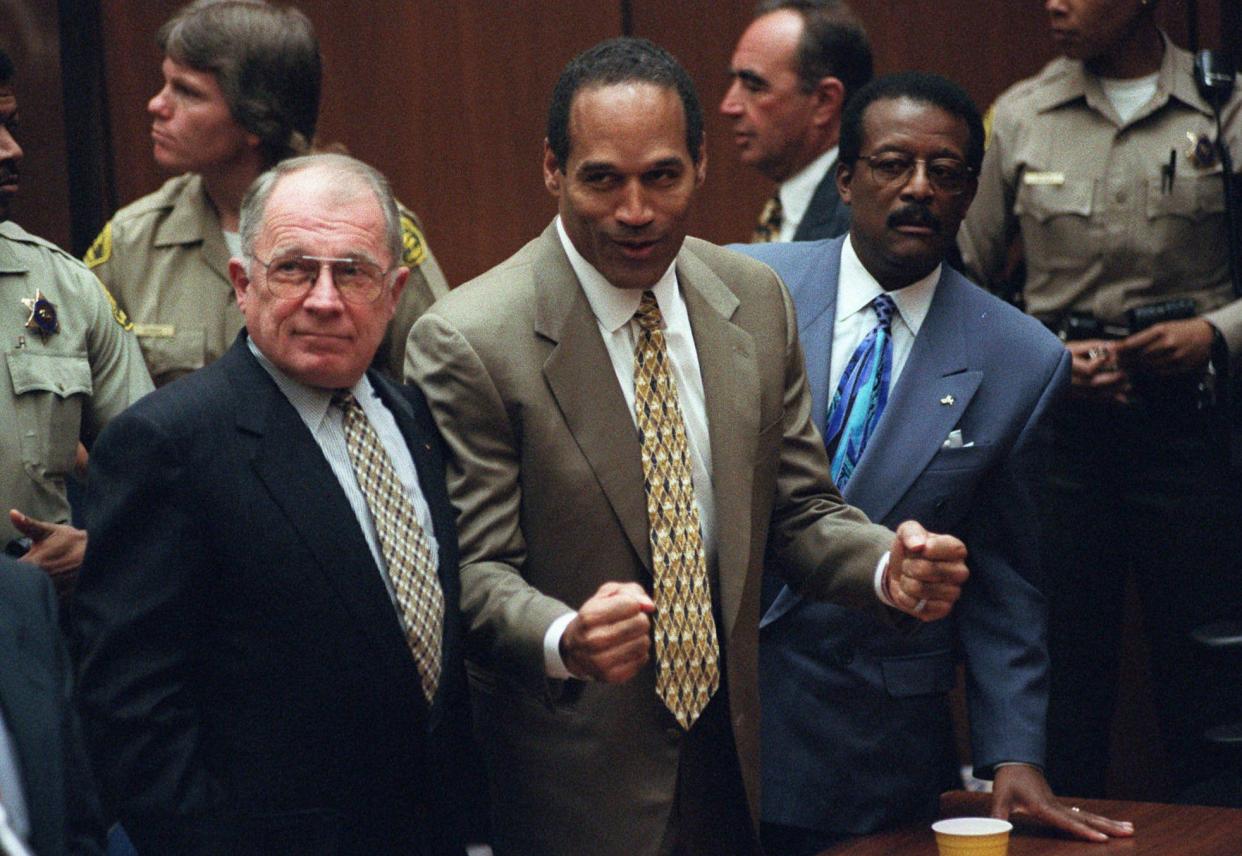Controversial attorney F. Lee Bailey is dead at 87
Attorney F. Lee Bailey, a man as celebrated and controversial as many of his high-profile clients, is dead at 87.
His son Bendrix Lee Bailey told TMZ that his father died Thursday in Georgia. He had reportedly been in hospice care. His death was not said to be related to COVID-19.
Bailey, a showman and crafty litigator who represented the Boston Strangler and Patty Hearst, was part of O.J. Simpson’s storied “Dream Team,” which helped the former football star beat a double-murder rap in 1995.

Simpson tweeted his condolences Thursday.
“I lost a great one,” he wrote. “F Lee Bailey you will be missed.”
I lost a great one. F Lee Bailey you will be missed. pic.twitter.com/6s8JI3OQVB
— O.J. Simpson (@TheRealOJ32) June 3, 2021
A year after the trial, Simpson said Bailey was the most valuable player on a team that included Johnnie Cochran, Robert Shapiro, Alan Dershowitz and Robert Kardashian.
It was Bailey who famously dressed down police officer Mark Fuhrman, doggedly questioning the investigator’s racial views. Audio recordings of Fuhrman making racist remarks were later introduced to the trial.
Bailey, who graduated from Boston University’s law school, also worked with accused Boston Strangler Albert DeSalvo and heiress Hearst, who was involved in a 1974 bank robbery along with members of the Symbionese Liberation Army militant group. Hearst later criticized Bailey’s handling of her case, which he lost, even suggesting the flamboyant lawyer was looking out for his own interests and turned the hearing into “a mockery, a farce, and a sham.”
The attorney didn’t deny having an eye for the spotlight. He was a familiar face on TV, appearing multiple times on talk shows hosted by Johnny Carson, Dick Cavett and David Frost, among others, and took part in many true-crime documentaries. He hosted a short-lived reality show called “Lie Detector” in 1983.
“The legal profession is a business with a tremendous collection of egos,” Bailey said in an interview with U.S. News & World Report in 1981. “Few people who are not strong egotistically gravitate to it.”
In his heyday, Bailey also represented murder suspect Sam Sheppard, the neurosurgeon whose life story inspired the 1960s TV series and the 1993 Harrison Ford film “The Fugitive.” Sheppard spent 10 years in prison before the Supreme Court ruled the chaos surrounding his trial may have effected the verdict and ordered an appeal, which was successful.
Former Army captain Ernest Medina, whose unit was involved in 1968′s My Lai Massacre in Vietnam, was a client of Bailey’s, too. Medina was court-martialed, but later reinstated over his role in the slaughter that reportedly left as many as 500 civilians dead.
In 1950, Bailey left Harvard University to train as a Marine pilot. He remained an aviation enthusiast throughout his life.
Bailey’s longtime legal partner, J. Albert Johnson, said he has “never known a greater intellect than that possessed by F. Lee Bailey.”
The Boston Globe reported that Bailey, who had an office in New York City at one point, was also known for having legal troubles of his own, which eventually led to his being disbarred multiple times. In 1982, the combative defense attorney was arrested on DUI charges in California.
According to the Globe, the big-spending legal eagle later saw his business practice struggle along with his finances. He was involved in a stock market debacle that led to his being jailed for 44 days in 1996 after spending money a court ruled was not his to keep.
Bailey was censured in 1970 by a Massachusetts judge who cited his “philosophy of extreme egocentricity.” The following year, he was disbarred for a year in New Jersey after speaking publicly about a case.
He was disbarred for judicial misconduct in Florida and also lost his law license in Massachusetts in 2001. Later attempts to revive his legal career were unsuccessful. He filed for bankruptcy in 2017.
Bailey was married four times and had three divorces. His fourth wife died in 1999.
With News Wire Services
